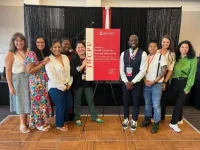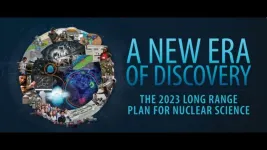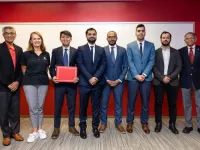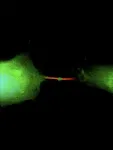(Press-News.org) The SUSTAIN Wellbeing COMPASS Coordinating Center of the University of Houston Graduate College of Social Work has made a lasting impact in the fight against the HIV epidemic in the Southern U.S. over the past five years, particularly for Black and Latinx-led organizations. The SUSTAIN Center is one of four across the South funded by the Gilead COMPASS Initiative®, an unprecedented 10-year, more than $100 million effort to address the Southern HIV epidemic by collaborating with local community organizations and stakeholders to use evidence-based solutions to meet the needs of people living with and impacted by HIV/AIDS.
Led by director and social work associate professor and Associate Dean of Doctoral Education Samira Ali, the center is focused on mental health, trauma-informed care, substance use (especially harm reduction and the opioid epidemic), telehealth, and wellness in the context of HIV/AIDS. The center provides justice-and community-centered grants, training, coaching, and conducts evaluation and research. The SUSTAIN Center has regranted approximately 60% of its $10 million award to community-based organizations which otherwise might not have had the funding to strengthen their services.
“We don’t just give the money to folks, we actually work with them, coach them, train them and have difficult conversations with them,” Ali said. “The relational aspect of our work has been a highlight.”
The U.S South accounted for 51% of new HIV diagnoses in 2020, although it is home to only one-third of the U.S. population. Black individuals account for 52% of people living with HIV. Ali’s team chose to work with primarily Black and Latinx-led organizations in the South, including nine organizations in Houston.
“We know from the data and research that Black-led organizations receive less funding than white-led organizations,” Ali said. “Anti-Black racism has a lot to do with it. We want to make sure the money and support are going to the places that need them the most.”
Providing Trauma-Informed Care
One of the greatest moments for the team was teaching trauma-informed care to a partner in South Florida that provides care and advocates for transgender and LGBTQ+ individuals.
“The executive director of the Transinclusive Group told us that before learning about trauma-informed care, she thought she had everything figured out,” said Marcus Stanley, director of programs and project officer for the coordinating center at UH. “She had been a sex worker, experienced homelessness and had rebuilt herself from all of that. By learning how to provide trauma-informed care, she had a chance to examine how trauma shows up in her own life, so the organization can better serve both clients and staff.”
In Gilead Sciences’ “Five Years, Five Voices” video series, Transinclusive executive director and co-founder Tatiana Williams said, “the Gilead COMPASS Initiative has helped me create an organization that is sustainable. They gave me the ability and the tools I need to be able to do the work that we do.”
One of the changes implemented was the addition of mental health days for staff. Instead of using vacation or sick time, a staff member can request a mental health day that is budgeted into their paid time off.
Case Study on Combatting HIV in the South
The SUSTAIN Wellbeing COMPASS Coordinating Center at UH led an initiative, “Showing Up for Black Power, Liberation and Healing,” that focused on providing a support space, training and funds to Southern organizations to combat anti-Blackness and to identify and address white supremacy work culture.
The team facilitated a participatory case study examining this initiative and published their findings in a supplemental issue of the Journal of Health Care for the Poor and Underserved, “The Gilead COMPASS Initiative®: Navigating HIV in the Southern U.S. by Building Capacity & Bridging Communities” issue. It features 16 articles by COMPASS grantees across the South and details the programs they implemented over the past five years to address the HIV epidemic within their communities.
The UH team writes that effectively combating HIV will require Southern HIV service organizations to support Black staff while they navigate traumas related to structural racism driving the epidemic. They highlight the power of defining and valuing Black-centered spaces to address trauma; reframing self-care from an individualistic responsibility to an institutionally supported, communal means of healing; and the role of the intervention in spurring organizational changes related to dismantling white supremacy work culture in southern HIV service organizations.
Meaningful Involvement of People Living with HIV
Stanley credits much of the UH SUSTAIN team’s success to the meaningful involvement of people living with HIV. SUSTAIN has a paid advocacy group that is comprised of people openly living with HIV.
“This was a big deal for me, because I come from a field where individuals relive and retell one of the most traumatic experiences of their lives for free or for a $25 gift card. We were able to treat these individuals like they matter,” Stanley said.
These valued members of the community provided insight when deciding what organizations to fund as well as curriculum and other programming.
“We did not create our grant-making process in a vacuum,” Stanley said. “We did a ‘listen-in tour’ where we went to almost all of the 12 states we’re serving. We went to each’s state’s most populous urban cities as well as rural cities and asked: What is the need? What capacity would be most beneficial for your community? We took that information and developed grants and trainings.”
Of the organizations the SUSTAIN Center has worked with, about 90% are grassroots groups with budgets of less than $100,000 and less than three employees. These organizations have since grown to employ multiple people and facilitate multiple programs, made possible by capacity building work the UH team has assisted them with, and funding.
Future Work: Continuing Programming and Public Impact
Looking ahead, Ali said her team will continue the project's programming by finding additional funding or additional partnerships to support the work.
She also looks forward to making her team’s efforts and research more accessible, what is known in social work as “public impact work in scholarship,” that ensures research does not stay in academia, but it is in the world for organizations and policy makers to use.
“The programming of the COMPASS Initiative ® was not something that was just handed to us. No one told us to create specific types of grants to support grassroots organizations to do trauma-informed organizational change,” Ali said. “This was all information we collected from the listen-in sessions and from what we learn working on the job. This was created by our team in collaboration with impacted communities.”
END
SUSTAIN Center at UH commemorates five years of combatting AIDS/HIV epidemic in Southern U.S.
SUSTAIN Wellbeing COMPASS Coordinating Center leadership reflects on accomplishments
2023-10-07
ELSE PRESS RELEASES FROM THIS DATE:
English faculty, grad students lead initiative to develop open access writing curriculum
2023-10-07
Long before another school year started for K-12 students across Texas, a Texas A&M University-led team has been hard at work behind the scenes to position high school students throughout the Lone Star state for future college writing success.
Leading the college-readiness charge is Dr. Terri Pantuso, an instructional associate professor in the Department of English and associate dean for assessment and curricular matters in the College of Arts and Sciences, who recently received a $1.2 million service contract from the Texas Higher Education Coordinating Board (THECB) aimed at better ...
The currency of conservation
2023-10-06
Governments, nonprofit organizations, and other groups spend roughly $100 billion a year to support conservation. Restrictions on where conservation funds can be spent, however, prevent organizations from focusing on the most promising opportunities to help species. A new study led by researchers at the University of Tennessee, Knoxville, suggests a way to improve the situation.
“There are plenty of conservation bargains still available in the United States,” said Paul Armsworth, professor in the UT Department of Ecology and Evolutionary Biology and lead author of the study. “Some ...
ORNL is poised to have a major role in the future of nuclear physics
2023-10-06
The Department of Energy’s Oak Ridge National Laboratory, a bastion of nuclear physics research for the past 80 years, is poised to strengthen its programs and service to the United States over the next decade if national recommendations of the Nuclear Science Advisory Committee, or NSAC, are enacted.
“The 2023 Long Range Plan lays out a compelling vision for nuclear science in the United States under multiple budget scenarios,” said Gail Dodge, physicist at Old Dominion University and chair of the NSAC. “Implementation of the Long Range Plan’s ...
UH energy competition focuses on innovation, commercialization and sustainability
2023-10-06
The world is full of good ideas, but only some of them become viable and real.
“You don’t see the full impact of a good idea until someone figures out a way to convert it to a usable product or service that has value, brings it to market and makes money off of it – this is what makes it a sustainable business,” said S. Radhakrishnan, a retired University of Houston business professor and coordinator of UH Energy’s Innovation Commercialization Competition. “To have a successful energy transition, we need many innovative ideas to be commercialized.”
Keeping this in mind, Radhakrishnan worked hard to grow the second annual Energy Innovation Commercialization ...
Remnant of cell division could be responsible for spreading cancer
2023-10-06
Once thought to be the trash can of the cell, a little bubble of cellular stuff called the midbody remnant is actually packing working genetic material with the power to change the fate of other cells — including turning them into cancer.
It’s a surprise to many people, according to Ahna Skop, a University of Wisconsin–Madison genetics professor, that when one cell divides into two, a process called mitosis, the result is not just the two daughter cells.
“One cell divides into three things: two cells and ...
CPR education drive expanded to London during the 2023 NFL London Games
2023-10-06
Photos will be added to the release link as available.
On average worldwide, fewer than one in every ten cardiac arrest victims outside of the hospital survive.[1] Too many people do not survive from cardiac arrest because those around them are not educated on the lifesaving skills of cardiopulmonary resuscitation (CPR). Knowing CPR can be a lifesaving tactic. On October 7, 2023, the Chasing M’s Foundation - professional football player Damar Hamlin’s charity - the American Heart Association, the British Heart Foundation ...
Possible tool discovered to diagnose common contributor to vascular dementia
2023-10-06
A research team led by the Keck School of Medicine of USC has discovered that a non-invasive eye exam may be a possible tool for screening Black Americans and other people from underdiagnosed and high-risk populations for cerebral small vessel disease, a major contributor to cognitive impairment and dementia. After Alzheimer’s disease, vascular dementia, associated with impaired blood flow to the brain, is the second most common dementia diagnosis.
“Most people with cerebral small vessel disease are not diagnosed until significant brain damage has occurred. Damage to the brain cells is not reversible.” ...
Research reveals disparities in access to quality parks
2023-10-06
In urban areas throughout the United States, it is imperative for all communities to have equal access to high quality parks. These parks can have many benefits for the physical and mental well-being of the residents who live in close proximity to the urban green spaces. For instance, they are a place to socialize and exercise outdoors while also providing vegetation nearby, which can help reduce urban heat.
Yet, in the City of Philadelphia, not all parks are created equal, according to a new study from the University of Delaware.
Using a machine learning algorithm to analyze 285 ...
Offspring of teen, young adult women with cancer history more likely to have birth defects
2023-10-06
The offspring of adolescent and young adult women with a history of cancer face a higher risk of birth defects, according to new research from UTHealth Houston.
A study led by Caitlin C. Murphy, PhD, MPH, associate professor of health promotion and behavioral sciences at UTHealth Houston School of Public Health, was published recently in Cancer Epidemiology, Biomarkers & Prevention.
“Concerns like the health of future children are at the top of mind for many young adults diagnosed with cancer, but they are already so overwhelmed at the time of diagnosis with ...
Benefits of psychedelics in obsessive-compulsive disorder: in search of evidence
2023-10-06
Intrusive thoughts, involuntary repetition of undesirable gestures and behaviors combined with high anxiety... Obsessive-compulsive disorder (OCD), a disabling condition, affects around 2% of the population, regardless of age. It is a strong vector of isolation since patients disproportionately focus on various obsessions—to the detriment of relationships, work, and leisure.
Treatment mainly consists of cognitive-behavioral therapy (CBT) that allows patients to readjust their thought patterns, combined with antidepressants. Unfortunately, the effects are slow to appear, and 30 to 40% of patients do not respond at all. “In this context, an option ...
LAST 30 PRESS RELEASES:
Bacteria frozen in ancient underground ice cave found to be resistant against 10 modern antibiotics
Rhododendron-derived drugs now made by bacteria
Admissions for child maltreatment decreased during first phase of COVID-19 pandemic, but ICU admissions increased later
Power in motion: transforming energy harvesting with gyroscopes
Ketamine high NOT related to treatment success for people with alcohol problems, study finds
1 in 6 Medicare beneficiaries depend on telehealth for key medical care
Maps can encourage home radon testing in the right settings
Exploring the link between hearing loss and cognitive decline
Machine learning tool can predict serious transplant complications months earlier
Prevalence of over-the-counter and prescription medication use in the US
US child mental health care need, unmet needs, and difficulty accessing services
Incidental rotator cuff abnormalities on magnetic resonance imaging
Sensing local fibers in pancreatic tumors, cancer cells ‘choose’ to either grow or tolerate treatment
Barriers to mental health care leave many children behind, new data cautions
Cancer and inflammation: immunologic interplay, translational advances, and clinical strategies
Bioactive polyphenolic compounds and in vitro anti-degenerative property-based pharmacological propensities of some promising germplasms of Amaranthus hypochondriacus L.
AI-powered companionship: PolyU interfaculty scholar harnesses music and empathetic speech in robots to combat loneliness
Antarctica sits above Earth’s strongest “gravity hole.” Now we know how it got that way
Haircare products made with botanicals protects strands, adds shine
Enhanced pulmonary nodule detection and classification using artificial intelligence on LIDC-IDRI data
Using NBA, study finds that pay differences among top performers can erode cooperation
Korea University, Stanford University, and IESGA launch Water Sustainability Index to combat ESG greenwashing
Molecular glue discovery: large scale instead of lucky strike
Insulin resistance predictor highlights cancer connection
Explaining next-generation solar cells
Slippery ions create a smoother path to blue energy
Magnetic resonance imaging opens the door to better treatments for underdiagnosed atypical Parkinsonisms
National poll finds gaps in community preparedness for teen cardiac emergencies
One strategy to block both drug-resistant bacteria and influenza: new broad-spectrum infection prevention approach validated
Survey: 3 in 4 skip physical therapy homework, stunting progress
[Press-News.org] SUSTAIN Center at UH commemorates five years of combatting AIDS/HIV epidemic in Southern U.S.SUSTAIN Wellbeing COMPASS Coordinating Center leadership reflects on accomplishments





